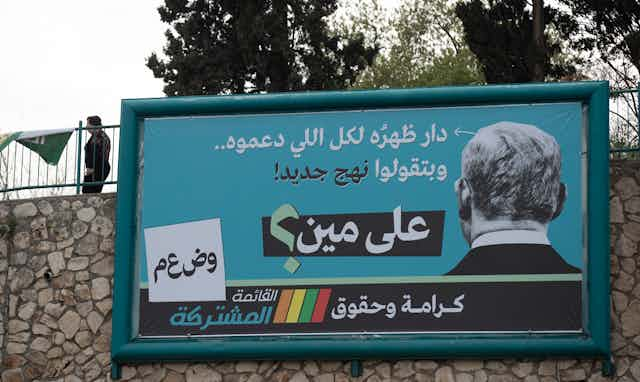Israeli voters are about to head to the polls for the fourth time in two years. And, once again, the issue of Palestine has been almost completely absent from debate during the campaign.
Once upon a time this would have been unimaginable. In 1992, Yizhak Rabin’s Labor Party won because of his willingness to strike a deal with Yasser Arafat’s PLO on the basis of land in exchange for peace. In 2001, the Labor party under prime minister Ehud Barak lost to Ariel Sharon’s Likud after the Oslo peace process had been derailed by the Al-Aqsa Intifada, which Sharon exploited by calling for a hardline military response.
In 2006, Sharon’s new centrist Kadima party defeated Likud on the basis of a security agenda which combined unilateral disengagement with the establishment of security walls between Israeli territory and Palestinian land in Gaza and the West Bank. Kadima won again in 2009, but the party’s victory over Likud was narrow, too narrow to keep its leader Benjamin Netanyahu from returning to the office of prime minister. He had successfully sold himself as the candidate more likely to counter what voters saw as a growing threat from Hamas in Gaza than his opponent, Kadima leader Tzipi Livni.
But what used to be a political law of nature is now increasingly becoming a thing of the past. In the three most recent election campaigns, in April and September 2019 and in February 2020, Palestine did not feature prominently in debates. And the issue has been ignored completely in the current election campaign, which ends when Israelis vote on March 23.
Neither Netanyahu’s Likud, nor Yair Lapid’s Yesh Atid, Gideon Sa’ar’s New Hope nor any other party representing the mainstream of the Israeli public has addressed the conflict. Partly this is to do with the COVID pandemic and the resulting economic crisis facing Israel. But even before the pandemic struck last year, the prominence of Palestine as an election issue was already waning.
Read more: Stark choice for Israel as voters head to polls for fourth time in two years
A more substantial explanation for this is that, slowly but surely, Palestine’s status as Israel’s number one perceived security threat has been overtaken by Iran due to its nuclear program and its quest for regional hegemony. This change in attitude among voters is supported by regular opinion polls as well as campaign rhetoric, especially from Netanyahu. But it’s fair to say Iran itself has had a hand in Israel’s changing security focus.
When in February an Israeli-owned cargo ship was hit by an explosion in the Gulf of Oman, Netanyahu was quick to point an accusing finger in the direction of Iran. He told the Israeli public broadcaster Kan that the incident “was indeed an act by Iran, that is clear”, adding: “Iran is the greatest enemy of Israel. I am determined to halt it. We are hitting it in the entire region.”
Referendum on Netanyahu
But the silence from Israeli politicians on the Palestinian issue during the past few campaigns is not only a consequence of changing power relations in the Middle East but also of internal political developments. The growing criticism of Netanyahu’s controversial leadership has been coupled with ongoing accusations of bribery and fraud. This time around, the question of whether Israel’s longest-serving prime minister has abused his office has reduced the current campaign to another referendum on his person.

Netanyahu is not only being attacked from the centre and the left but also from the right. Gideon Sa'ar, a high-profile former Likud minister quit the party in December to form his own group to challenge Netanyahu.
Israel’s shift to the right
Another important factor in the disappearance of the Palestinian issue from election debates is the Israeli electorate’s shift to the right. Labor, traditionally the strongest opponent to Likud, hit a historic low of six seats after the 2019 elections, replaced by right-wing and centre-right parties who have been gaining support for years. These parties either support Likud’s Greater Israel plan or have no strong views on the ongoing occupation and further colonisation of the West Bank.
The Israeli electorate’s shift to the right is a result of the country’s changing demographic structure. Over the past few decades there has been a strong increase in the number of Arab (Mizrahi) Jews, as well as an increased influx of Russian Jews following the end of the cold war. There has also been an explosive growth of ultra-Orthodox, or Haredi Jews and an ever-expanding number of ultra-nationalist and nationalist-religious Jews settling in the West Bank.

Especially for the Mizrahi Jews, Labor as Israel’s founding party was never an option because they felt not being represented by Israel’s founding party that had been established by mainly European (Ashkenazi) Jews. Moreover, all of these groups struggled to identify with Labor’s moderate Zionist worldview that, different from Likud’s more aggressive neo-revisionist Zionism, was not necessarily based on territorial maximalisation.
Rightist Israeli politicians have wilfully nurtured this shift by successfully selling the idea of Israel as a small and isolated nation surrounded by powerful and hostile enemies. As such, the argument runs, it has no other option than to defend itself and consolidate new territory for security reasons.
In shaping and reinforcing this siege mentality, the rightist political establishment has not only been assisted by the military establishment and a largely biased media but also by the security fences. These have not only been effective in keeping the Palestinians out but have also helped reduce how much of a threat Israelis perceive them to be.

